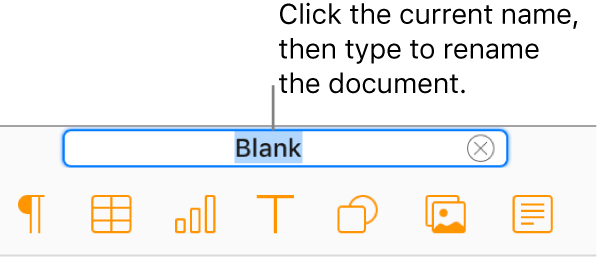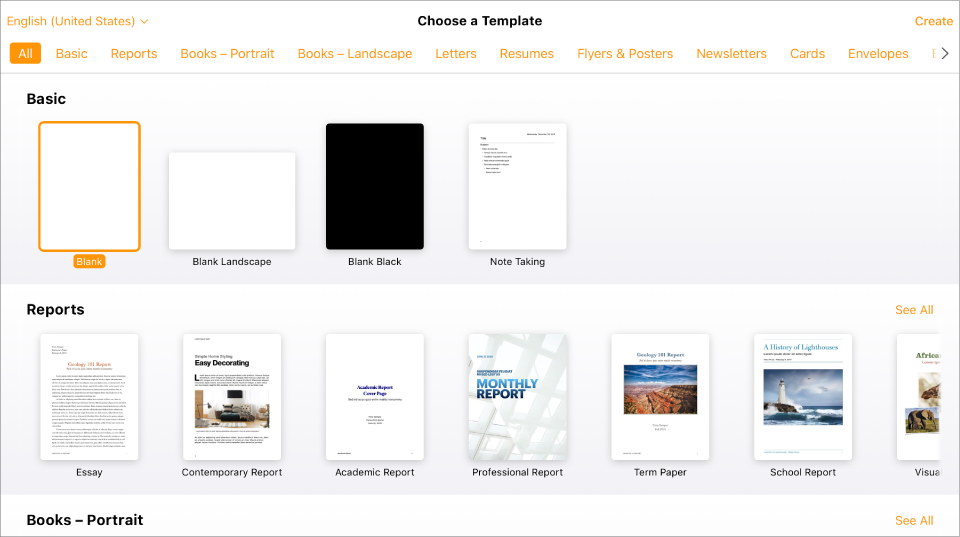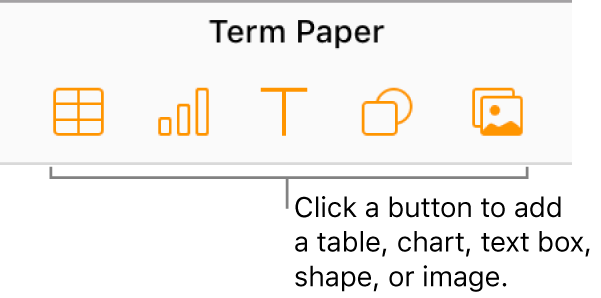
Create your first document in Pages for iCloud
To create a document, you first choose a template to use as a starting point. Templates use coordinated fonts, colors, and graphic elements for a unified look. There are word-processing templates for documents that are primarily text (such as reports and letters), and page layout templates for more customized documents (such as books, posters, and flyers).
To quickly create a word-processing document, see the first task below. To learn about more detailed formatting and design options (including formatting text or adding images), or how to create a page layout document, see the second task.
Create a basic word-processing document
In the document manager, click the Create Document button
 in the toolbar.
in the toolbar.Double-click one of the blank templates in the Basic category (these are all word-processing templates).
Start typing.
A new page is added automatically as you reach the end of the page.
To name your document, click the name at the top of the document, type a new name, then press Return (on a Mac) or Enter (on a Windows computer).
Pages for iCloud automatically saves your document as you work, so you don’t need to worry about saving it manually.

Create and format a document
In the document manager, click the Create Document button
 in the toolbar.
in the toolbar.Note: If you’d like the ability to format table and chart data for another language, choose a different language in the top-left corner before choosing a template. See Create a document with the formatting of a different language in Pages for iCloud.
Double-click a template (to narrow the choices, click a category along the top).
To create a document that’s mainly text, choose one of the Basic templates (these are all word-processing templates).
To create a brochure, poster, or something with a more complex layout, choose a template that looks closest to what you want to create. The choices include a variety of word-processing and page layout templates.
Note: To create an interactive book, choose a book template. When you export a book template in EPUB format, it can be opened in Apple Books and other ebook readers.

Do any of the following:
Add text: In a blank word-processing template, just begin typing. The blinking insertion point indicates where your text starts. In either a word-processing or page layout template with placeholder text, click the placeholder text, then type.
Note: In some templates, the placeholder text is written in lorem ipsum (scrambled Latin text), but the text you type to replace it still appears in the language you use for iCloud.
Edit text: Select some text, then type to replace it. To format the selected text, in the Format
 sidebar on the right, click the Style button near the top, then make your choices.
sidebar on the right, click the Style button near the top, then make your choices.Replace images: Select the image, click Image at the top of the Format
 sidebar, then click Replace. Browse to find a new image, then double-click it.
sidebar, then click Replace. Browse to find a new image, then double-click it.Add new text boxes, images, shapes, or other objects: Click an object button in the toolbar.

Add a page: In a word-processing document, new pages are automatically added to the end of the document as needed; however, you can also add a blank page manually. To add a new page to a page layout document, click the Add Page button
 in the toolbar.
in the toolbar.Undo or redo a change: Click the Undo button
 or the Redo button
or the Redo button  in the toolbar.
in the toolbar.Enlarge (zoom in) or reduce (zoom out) your overall view of a document: Click the Zoom pop-up menu (with the percentage) in the toolbar, then choose an option.

Click the document’s current name at the top of the document, type a new name, then press Return (on a Mac) or Enter (on a Windows computer).

Pages for iCloud automatically saves your changes as you work, so you don’t need to worry about saving your document manually.
To close a document, move the cursor over the document’s title at the top, then click the X that appears on the browser tab.